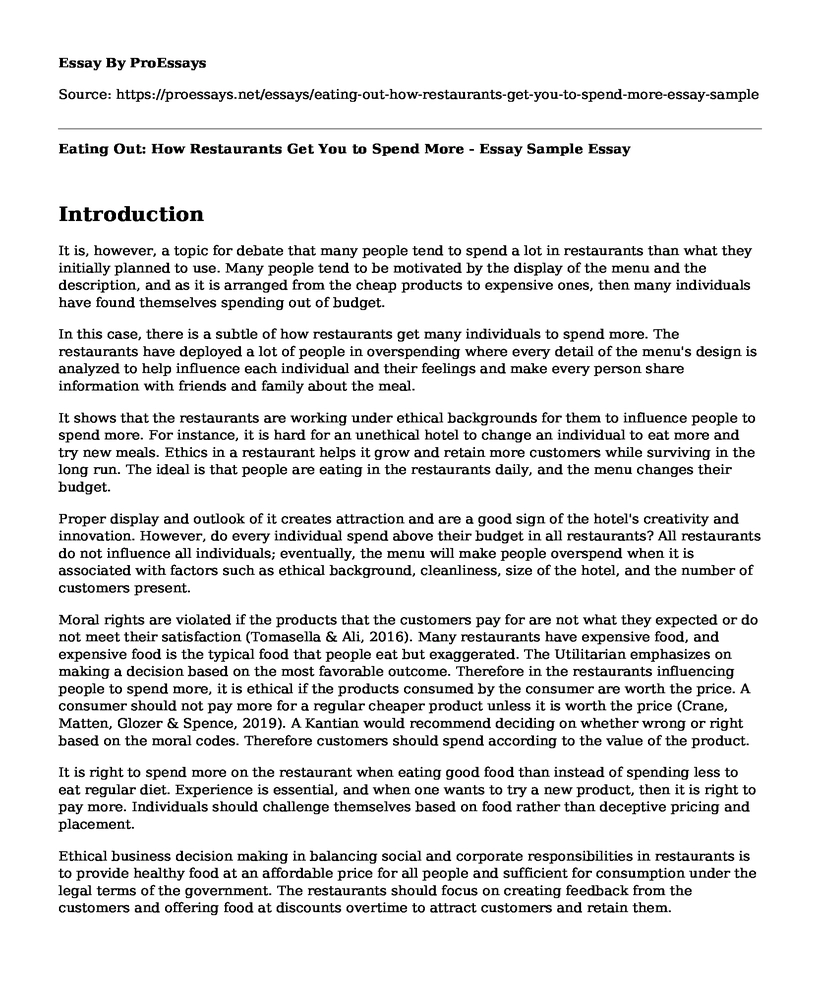Introduction
It is, however, a topic for debate that many people tend to spend a lot in restaurants than what they initially planned to use. Many people tend to be motivated by the display of the menu and the description, and as it is arranged from the cheap products to expensive ones, then many individuals have found themselves spending out of budget.
In this case, there is a subtle of how restaurants get many individuals to spend more. The restaurants have deployed a lot of people in overspending where every detail of the menu's design is analyzed to help influence each individual and their feelings and make every person share information with friends and family about the meal.
It shows that the restaurants are working under ethical backgrounds for them to influence people to spend more. For instance, it is hard for an unethical hotel to change an individual to eat more and try new meals. Ethics in a restaurant helps it grow and retain more customers while surviving in the long run. The ideal is that people are eating in the restaurants daily, and the menu changes their budget.
Proper display and outlook of it creates attraction and are a good sign of the hotel's creativity and innovation. However, do every individual spend above their budget in all restaurants? All restaurants do not influence all individuals; eventually, the menu will make people overspend when it is associated with factors such as ethical background, cleanliness, size of the hotel, and the number of customers present.
Moral rights are violated if the products that the customers pay for are not what they expected or do not meet their satisfaction (Tomasella & Ali, 2016). Many restaurants have expensive food, and expensive food is the typical food that people eat but exaggerated. The Utilitarian emphasizes on making a decision based on the most favorable outcome. Therefore in the restaurants influencing people to spend more, it is ethical if the products consumed by the consumer are worth the price. A consumer should not pay more for a regular cheaper product unless it is worth the price (Crane, Matten, Glozer & Spence, 2019). A Kantian would recommend deciding on whether wrong or right based on the moral codes. Therefore customers should spend according to the value of the product.
It is right to spend more on the restaurant when eating good food than instead of spending less to eat regular diet. Experience is essential, and when one wants to try a new product, then it is right to pay more. Individuals should challenge themselves based on food rather than deceptive pricing and placement.
Ethical business decision making in balancing social and corporate responsibilities in restaurants is to provide healthy food at an affordable price for all people and sufficient for consumption under the legal terms of the government. The restaurants should focus on creating feedback from the customers and offering food at discounts overtime to attract customers and retain them.
Through technology, the hotels should enhance privacy and ensure that it is a business free from harassment and discrimination through distributing food equally to the customers and ensure that what they order is what is delivered and on time. There is also a need for health and safety as it has become an issue in business ethics where products offered are not safe for human consumption.
Ethic issues require the organization to choose between various alternatives that are evaluated as ethical or unethical. All customers appreciate ethical and honest practices and also helps build the firm's reputation and avoid legal issue while benefiting every stakeholder in many firms.
Reference
Crane, A., Matten, D., Glozer, S., & Spence, L. (2019). Business ethics: Managing corporate citizenship and sustainability in the age of globalization. Oxford University Press. Retrieved from https://books.google.com/books?hl=en&lr=&id=fcSbDwAAQBAJ&oi=fnd&pg=PP1&dq=business+ethics+in+restaurants&ots=Mrihetq2LA&sig=ZZAz9JWrjMONjY-OzRtfYpxI0k8
Tomasella, A. B., & Ali, A. (2016). Corporate Social Responsibility (CSR) digital communication in small independent restaurants. Retrieved from https://www.researchgate.net/profile/Barbara_Tomasella/publication/314350164_Corporate_Social_Responsibility_CSR_digital_communication_in_small_independent_restaurants/links/58c0a457a6fdcc06453f15e4/Corporate-Social-Responsibility-CSR-digital-communication-in-small-independent-restaurants
Cite this page
Eating Out: How Restaurants Get You to Spend More - Essay Sample. (2023, Mar 20). Retrieved from https://proessays.net/essays/eating-out-how-restaurants-get-you-to-spend-more-essay-sample
If you are the original author of this essay and no longer wish to have it published on the ProEssays website, please click below to request its removal:
- Paper Example on Exploring Hyatt Hotels Geneva Strategy
- International Business and Walmart Paper Example
- Domino's Pizza Case Study Report
- Essay Example on Adhering to Professional Ethics: A Necessity for All
- Essay Example on Pilston's Kitchen: 60 Years of Tradition on the Brink of Collapse
- Age-Defining Plant-Based Cooking: Health-Enhancing Recipes for Soul-Inspired Eating - Essay Sample
- Essay Example on Dreams and Growing Up: My Dad's Inspiration







